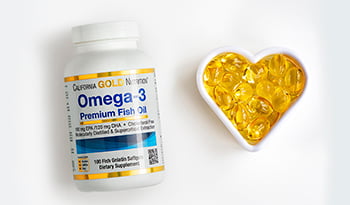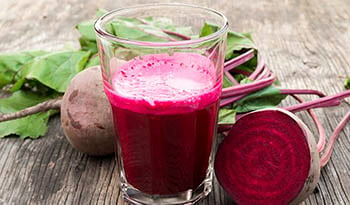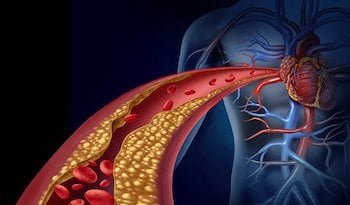CoQ10: The Best Supplement for Heart Health

In a typical day, the human heart beats over 100,000 times to pump more than 5,000 gallons of blood through over 60,000 miles of blood vessels. Over a lifetime that translates to over 2.5 billion heartbeats pumping a total of 100 billion gallons of blood.
It is important to support the health of your heart so that it can perform its vital function. There are many dietary, lifestyle, and nutrients that support heart health. But for those dealing with any stress or challenge in heart function, supplementing with coenzyme Q10 (CoQ10) may be critical.
What is CoQ10?
CoQ10 is an antioxidant in the body used in the production of energy by mitochondria - the energy-producing unit of the cells of our body.
Most of the time, the body produces enough CoQ10 itself. But considerable research shows that there are many situations where the body as a whole or certain tissues do not make sufficient levels of CoQ10.
In particular, low CoQ10 levels are found whenever the heart or vascular system is stressed.1 Cholesterol-lowering statin drugs and several other drugs lead to lower CoQ10 levels. Most physicians are now aware of the importance of supplementing CoQ10 in their patients taking statins to prevent the drop in CoQ10 levels.2 Low CoQ10 levels are also found with inflammation, obesity, and diabetes. Lastly, people over the age of 60 typically have lower CoQ10 levels as manufacture within cells is known to decline as we age. Fortunately, taking CoQ10 as a dietary supplement can restore proper levels of this critical compound.3
What Are The Health Benefits of CoQ10?
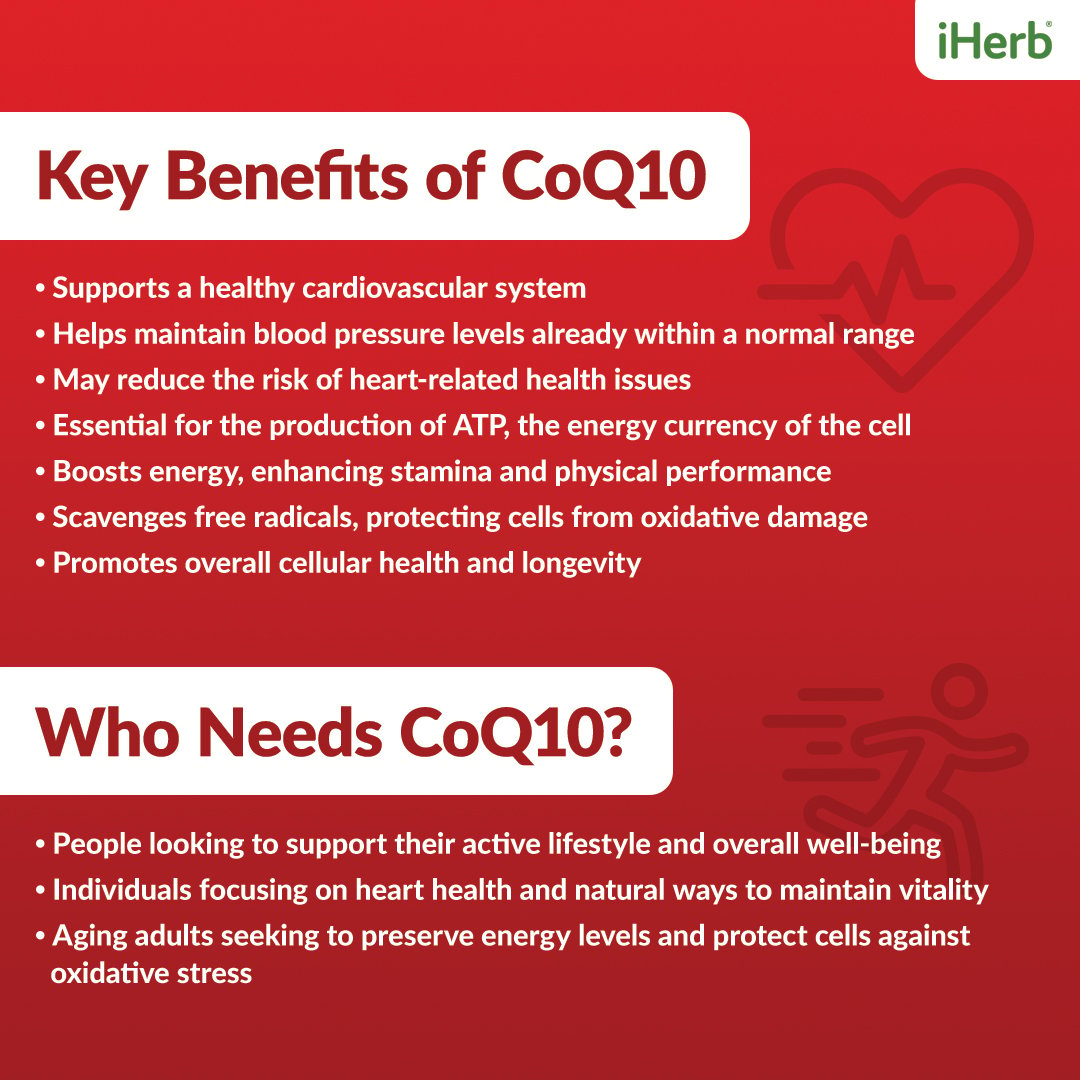
CoQ10 has emerged over the last 40 years as a best-selling dietary supplement based upon a very large body of scientific research highlighting significant health benefits. Most of the health benefits of CoQ10 involve its ability to improve energy production and act as an antioxidant. As an antioxidant, CoQ10 protects cell structures against damage. It also helps to keep vitamin E in its active antioxidant form and increases the levels of key antioxidant enzymes that further protect cells from damage.4
Why is CoQ10 Important for Heart Health?
Human clinical trials have extensively documented the benefits of CoQ10 in improving the function of the heart. It is easy to understand why. CoQ10 is essential to the cells of the heart and whenever cells of the heart are stressed or challenged it creates an increased demand for CoQ10.
Supplementation with CooQ10 in these situations is simply supplying the demand. Clinical studies demonstrate that correcting a CoQ10 deficiency can produce significant improvements in heart function.5-7 Here are the key benefits noted in clinical studies with CoQ10 in improving the function of the heart:
- Increased use of oxygen by the heart muscle.
- Increased production of cellular energy production by the heart muscle.
- Increased exercise capacity in people with impaired heart function.
- Improved blood pressure control.
Again, supplementing with CoQ10 is especially important in people taking a statin drug to lower cholesterol. The manufacture of cholesterol and CoQ10 flows down the same biochemical pathway. Statins blocking this pathway upstream of both CoQ10 and cholesterol This blockage leads to lower levels of both cholesterol and CoQ10. With statin use, CoQ10 levels can drop by as much as 50%.8 Researchers have concluded that lower CoQ10 levels caused by statin drugs might be responsible for some of the side effects reported for statins, such as fatigue and muscle pain.9 Supplementation with CoQ10 in statin users can improve the tolerability of these drugs.
What is The Best Form of CoQ10?
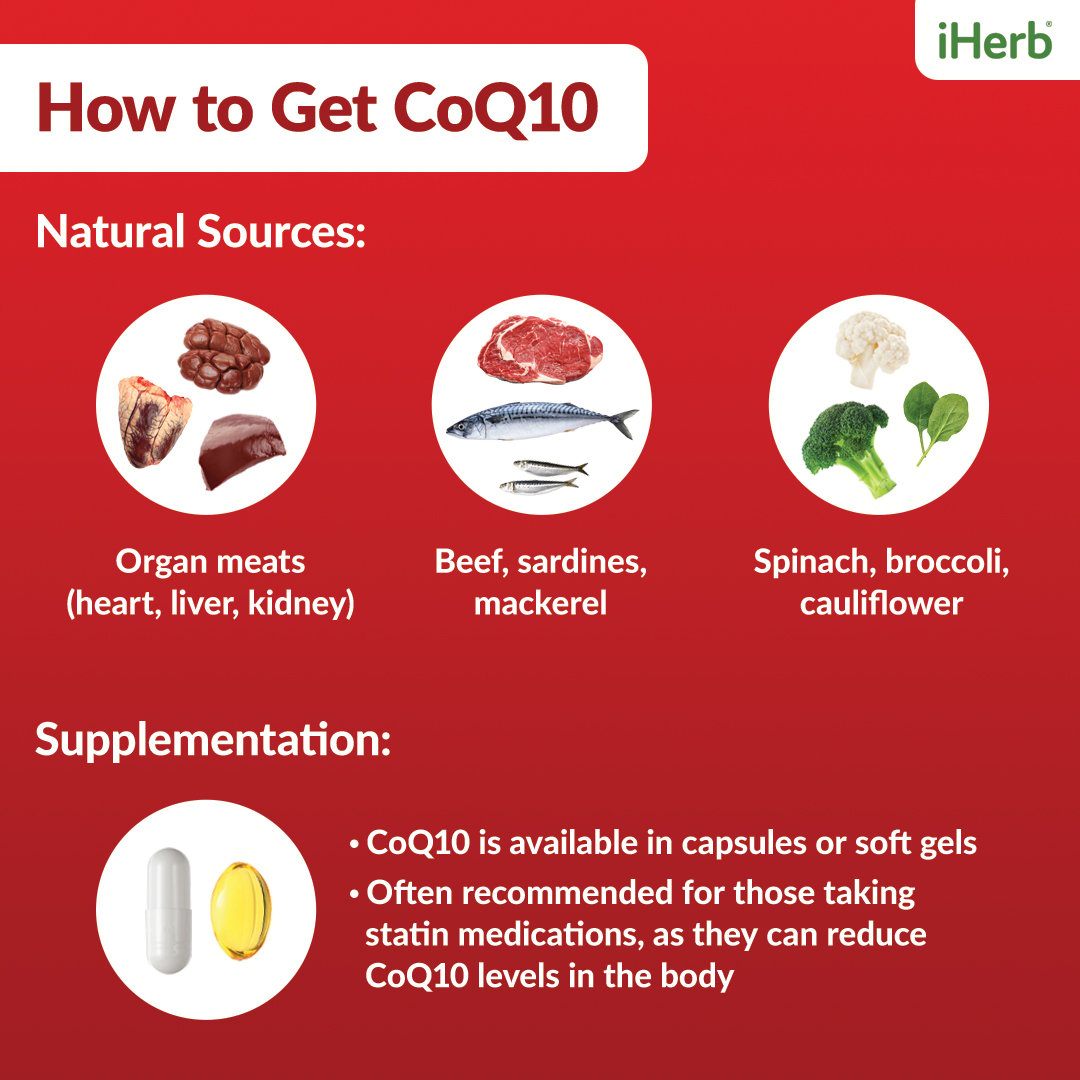
Most commercially CoQ10 is primarily produced via a yeast fermentation process. CoQ10 is available in two interchangeable chemical forms in the body – ubiquinone and ubiquinol. These two forms are also available as dietary supplements, but once absorbed the two forms are interchangeable. About 95% of the CoQ10 in the body is in the ubiquinol form. This form is the most active form. However, taking ubiquinone usually results in an easy conversion to ubiquinol in the body. So, either form ultimately raises ubiquinol levels in the blood.
Until 2007, CoQ10 as a dietary supplement was only available in the ubiquinone form. Ubiquinone is still the form that has been used in the overwhelming majority of studies showing benefit with CoQ10 supplementation. These studies used ubiquinone for a wide range of indications including supporting heart health. Ubiquinone is a crystalline powder that is insoluble in water and is difficult to absorb when given on an empty stomach. However, when taken with food (especially with oils), ubiquinone is absorbed in least two times better than when taken on an empty stomach.10
The ubiquinol form does have better solubility and as a result, slightly improved bioavailability than ubiquinone, but exactly how much better absorbed it is than ubiquinone has not been clearly determined.11,12 Fortunately, there is a lot of existing information from all the published clinical studies that allow appropriate dosage recommendations for either form.
How Much CoQ10 Should I Take?
For people who are taking a statin drug or those seeking general antioxidant support, the dosage for CoQ10 is generally100 mg for either form. For those with increased need due to stress of the heart, aging, obesity, or diabetes; the dosage is 150 to 200 mg for ubiquinone and 100 to 150 mg for ubiquinol. Be sure to take CoQ10 with food for maximum absorption.
Side Effects and Drug Interactions of CoQ10
CoQ10 dosages up to 1,200 mg/day in adults have shown to not produce side effects. In addition to statins, there are other drugs that may lower CoQ10 levels by blocking its manufacture. These include including other cholesterol-lowering drugs as well as beta-blockers, phenothiazines, and tricyclic antidepressants.
References:
- Mantle D. Coenzyme Q10 and cardiovascular disease: An overview. Brit. J Cardiol. 2015;22:1–7.
- Kloer HU, Belardinelli R, Ruchong O, Rosenfeldt F. Combining Ubiquinol With a Statin May Benefit Hypercholesterolaemic Patients With Chronic Heart Failure. Heart Lung Circ. 2020 Feb;29(2):188-195.
- Díaz-Casado ME, Quiles JL, Barriocanal-Casado E, et al. The Paradox of Coenzyme Q10 in Aging. Nutrients. 2019 Sep 14;11(9):2221.
- Akbari A, Mobini GR, Agah S, et al. Coenzyme Q10 supplementation and oxidative stress parameters: a systematic review and meta-analysis of clinical trials. Eur J Clin Pharmacol. 2020 Jun 25.
- Martelli A, Testai L, Colletti A, Cicero AFG. Coenzyme Q10: Clinical Applications in Cardiovascular Diseases. Antioxidants (Basel). 2020 Apr 22;9(4):341.
- Di Lorenzo A, Iannuzzo G, Parlato A, et al. Clinical Evidence for Q10 Coenzyme Supplementation in Heart Failure: From Energetics to Functional Improvement. J Clin Med. 2020 Apr 27;9(5):1266. doi: 10.3390/jcm9051266.
- Mortensen AL, Rosenfeldt F, Filipiak KJ. Effect of coenzyme Q10 in Europeans with chronic heart failure: A sub-group analysis of the Q-SYMBIO randomized double-blind trial. Cardiol J. 2019;26(2):147-156. doi: 10.5603/CJ.a2019.0022. Epub 2019 Mar 5. PMID: 30835327.
- Qu H, Meng YY, Chai H, Liang F, Zhang JY, Gao ZY, Shi DZ. The effect of statin treatment on circulating coenzyme Q10 concentrations: an updated meta-analysis of randomized controlled trials. Eur J Med Res. 2018 Nov 10;23(1):57. doi: 10.1186/s40001-018-0353-6. PMID: 30414615; PMCID: PMC6230224.
- Qu H, Meng YY, Chai H, et al. The effect of statin treatment on circulating coenzyme Q10 concentrations: an updated meta-analysis of randomized controlled trials. Eur J Med Res. 2018 Nov 10;23(1):57. doi: 10.1186/s40001-018-0353-6. PMID: 30414615; PMCID: PMC6230224.
- Ochiai A, Itagaki S, Kurokawa T, et al. Improvement in intestinal coenzyme q10 absorption by food intake. Yakugaku Zasshi. 2007 Aug;127(8):1251-4.
- Hosoe K, Kitano M, Kishida H, et al. Study on safety and bioavailability of ubiquinol (Kaneka QH) after single and 4-week multiple oral administration to healthy volunteers. Regul Toxicol Pharmacol. 2007 Feb;47(1):19-28.
- Zhang Y, Liu J, Chen XQ, Chen CY . Ubiquinol is superior to ubiquinone to enhance Coenzyme Q10 status in older men. Food Funct. 2018 Nov 14;9(11):5653-5659.
DISCLAIMER:This Wellness Hub does not intend to provide diagnosis...

















































































 Table of Contents
Table of Contents







